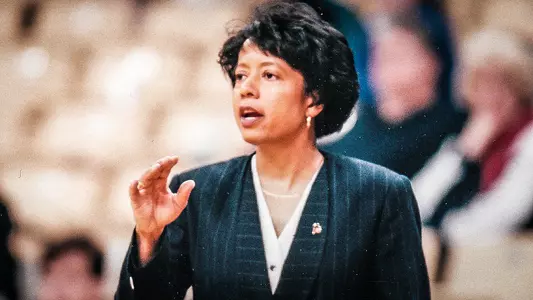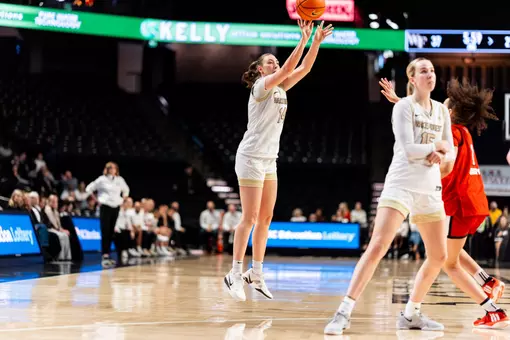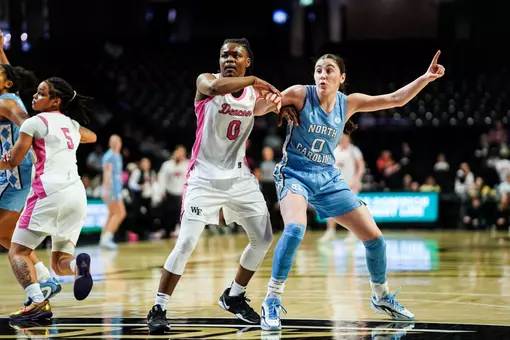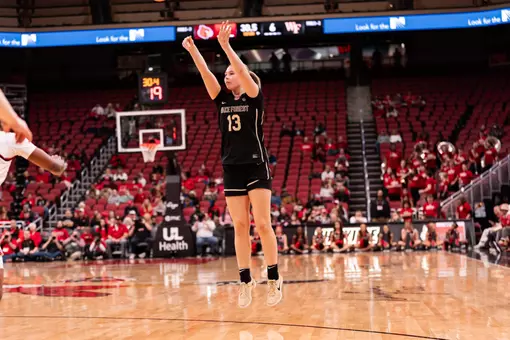Wake Forest Athletics

Trailblazer Charlene Curtis: First to Forge the Paths for Others
2/18/2021 12:21:00 PM | Women's Basketball
“I may have been a first at doing a lot of things. But I certainly didn't want to be the last.” - Charlene Curtis
Black History Month:
Wake Forest Athletics will have many stories and content throughout Black History Month on GoDeacs.com and through all team social media accounts. Information and profiles shared are archived here.
WINSTON-SALEM, N.C. -- Charlene Curtis' resume would read impressively regardless of the context, the bullet points of her various roles showcasing her talent with a brisk efficiency of someone who earned her long career in collegiate athletics. Among her over four decades in collegiate athletics, her roles included:
- Head women's basketball coach at Radford.
- Head women's basketball coach for Wake Forest.
- Women's basketball analyst for Fox Sports South and ESPNU.
- ACC Head of Officiating for women's basketball.
But when one adds the context to those bullet points? How Curtis was the first African-American on Radford's women's basketball team in 1972? The first 1,000-point scorer, male or female, in Radford history?
The first ever head of officiating for the ACC in women's basketball, thanks to the league creating the position separate from former associate commissioner duties? How leading the ACC's officials also meant leading the referees in the Big South, the Southern Conference and the Colonial Athletic, thanks to a development program she maintained and grew in her time in the league office?
How she was not only the first African-American women's basketball coach in Wake Forest history, but also the first African-American women's basketball coach in the entire ACC?
Well, it's hard not to think of Charlene Curtis as a trailblazer. It's a term that she acknowledges, but not one that she focuses on when looking back at her career.
"I may have been a first at doing a lot of things," Curtis said. "But I certainly didn't want to be the last."
It took a little while for those "firsts" to start accumulating for Curtis, thanks to the forces of society in the Jim Crow South.
Growing up in the Civil Rights era in Roanoke, Va., Curtis didn't attend a school that was truly desegregated until her junior year of high school, and spent much of her youth limited as to where she was allowed to go. Quickly, however, as the world around her changed ever so slowly, she earned opportunities.
At first, through her talent in music, where she earned her first ever "first," as the first African-American in the Roanoke Youth Symphony.
Her love of athletics also remained strong, leading her to try out for the women's basketball team as a freshman at Radford in 1972. Title IX had just passed that same year, and Radford didn't even offer scholarships for women's athletics at the time.
But Curtis' talent won out, as she made the team, starting all four years as the Highlanders' first African-American player in women's basketball.
Coaching, however, was not something on Curtis' radar as a student-athlete. It was her love of music, after all, that took her to Radford University, where she majored in music and dreamed of becoming a high school band director.
When her coach, Pat Barrett, gave her an opportunity to help coach girls basketball camps around Virginia, the thought entered her mind that she might have the aptitude for it.
"The only coaches that I knew were those who were physical education teachers," Curtis said. "And I was not going to be a physical education teacher. So, I was kind of unique in how I got into what I was doing."
Her first coaching experience came shortly after she graduated, in her first job as a teacher, and eventually a band director, in Bedford County, Va. Where she not only was the first African-American coach at the school she taught at, but the first African-American teacher, period.
"I didn't look at being the only one," Curtis said. "But I looked at the opportunity to excel and to do my best, so that I could open the door for someone to come behind me."
Curtis would open many more doors in the ensuing decades, earning a graduate degree from the University of Virginia while coaching under legendary head coach Debbie Ryan, eventually succeeding her old coach Pat Bennett at Radford at just 29 years old in 1984.
She later became the first ever African-American head coach for women's basketball at Temple University, then an assistant coach under her old Virginia colleague Geno Auiremma at Connecticut, before Ron Wellman hired her as Wake Forest's first African-American women's basketball coach in 1997.
While she was the only African-American coach among her peers in the ACC, she was not the only African-American head coach on Reynolda Campus.
Jim Caldwell led the football team at the time, someone Curtis was grateful to have him as a resource, with the two sharing the honor of the highest ranking African-Americans on staff in the athletic department at the time.
Her time in Winston-Salem would see her cross paths with Dave Odom and Skip Prosser, with Prosser in particular enlisting her help in his mission to change the athletics' culture at the university.
While she may have been one of few, and occasionally the only person of color in certain rooms at both Wake Forest and in the ACC, that fact was never something at the front of her mind day-to-day at Wake Forest.
She knew that for that door to remain open for African-American coaches after her, she would need to make sure her student-athletes had chances to succeed not just on the court, but beyond.
"Yes, we wanted to win basketball games," Curtis acknowledged with a smile. "But the educator in me was always (saying) 'let's provide opportunities so these student-athletes can be successful when they leave here.' That they don't just leave Wake Forest with a Wake Forest degree, that they leave Wake Forest with a Wake Forest education."
Curtis has certainly had her share of former Demon Deacons go on to future success, in large part thanks to her 100-percent graduation rate during her time at the program's helm from 1997-2004.
Adell Harris, a star guard for Curtis from 1998-2002, served as head coach for UNC-Willmington's women's basketball program, and now is chief of staff for Jerry Stackhouse's men's basketball team at Vanderbilt.
Porsche Jones, a Winston-Salem native and guard Curtis recruited to Wake, founded the BOND (Building on New Development) Center of Excellence to help youth earn opportunities after high school, whether through basketball or through their other excellence.
And LaChina Robinson, a four-year starter under Curtis and 1999 All-Freshman ACC team member, who perhaps is the player that followed Curtis' most directly through the doors she opened, now a women's basketball analyst at ESPN like Curtis was in the late 2000s on ESPNU, the first time the network had anyone work as a full-time women's basketball analyst in studio for ESPNU.
The endcap to Curtis' long career of trailblazing came in 2008, when she was hired as ACC's Supervisor of Women's Basketball officials.
It was a job Curtis did not expect, but had inadvertently been prepared for by Bernadette McGlade, the former ACC associate commissioner who oversaw women's basketball, and its officials. McGlade had long asked Curtis to assist with her officiating clinics, offering a coach's perspective when grading out officials. So when McGlade left the ACC to become the commissioner of the Atlantic-10, Curtis was prepared to take over the oversight of officials when the ACC split McGlade's role into two.
Curtis was surprised to have the role offered to her. But, it was a job she felt she had the skills to succeed in, thanks to her ability to create an environment for people of all backgrounds to thrive.
"The same goal I had as a coach was to provide an environment so that the officials could be successful doing what they did," Curtis said. "Because I couldn't go out and blow the whistle, just like I could not go out and shoot jumpshots in the middle of a basketball game. The players did it, and the officials had to do their job."
Curtis oversaw a plethora of rule changes and transitions during her time at the ACC, including the introduction of the 10-second backcourt violation, the implementation of the four quarters system and the conference's use of instant replay.
By the time she retired in 2019, she had seen the women's college game modernize itself to the international standards it had long prided itself on maintaining when the rulebook was first developed for AIAW play in the 1960s and 70s. Whenever she sees a team run a successful play after bringing the ball up to the front court during a timeout in the last minute of the half, or try to go two-for-one in the closing seconds of the quarter, she gets a sparkle in her eye seeing the game raise its level of play.
Curtis still lives in Winston-Salem, still invested in the Wake Forest women's program from afar, relaying back specific moments of recent games in conversation with the foresight of a coach's mind still buzzing with excitement.
The ACC has made a lot of progress on the diversity front since Curtis last coached in the league. A third of the conference's women's basketball head coaches, five out of fifteen, are African-American at the start of the 2020-21 season.
She's been encouraged by the progress that's been made in her career, so she won't be the last African-American coach, or analyst or administrator hired in her industry.
She notes that African-American coaches are starting to get more second chances if the first chance didn't work out, just like she was one of the first coaches to get a second chance after she was fired at Temple.
She thinks national title wins by coaches like Dawn Staley at South Carolina and Carolyn Peck at Purdue will do for African-American women's basketball coaches what John Thompson's men's basketball title at Georgetown did for African-American men's basketball coaches: give them more opportunities to succeed.
"When we allow for diversity in our ranks, we allow for more ideas, better ways of doing things, and I believe more success overall," Curtis said. "There are plenty of opportunities for everyone. But someone has to make a decision and be intentional about doing that."
Curtis knows there's still lots more work to be done. She saw first hand the need for a more diverse group of officials in her time with the ACC, particularly women and officials of color.
She wants to help get current student-athletes invested in the possibility of working as an official after they've graduated, hopefully with an effort similar to the Women's Basketball Coaches' Association's 'So you want to be a coach?' program, which has been successful at getting more former student-athletes into the coaching ranks.
But what Curtis is most excited about are the possibilities yet to be discovered, the doors thathave yet to be opened that the coming generation has a chance to crack.
Charlene Curtis may have been one of the first trailblazers, but she certainly won't be the last.
"Create your own opportunities. Be creative in your thought, your process," Curtis advised the next group of trailblazers. "That's what's exciting to me, that you don't have to be a part of a major corporation to make a difference in your community. You can make a difference in your community by yourself, maybe with a small group of supporters around you."



